We often talk about being "well," but what does that mean? Do we just mean not being sick? Or is there something more to it than that? Many people mix up the ideas of "health" and "wellness," but they're different. Health is like your body's physical condition – are you disease-free? Wellness is a much bigger picture. It's about your overall well-being, including your physical health, mental and emotional health, social connections, and how you feel about your life. When we understand the little differences between health and wellness, we can make better choices that help us feel good in every way, not just physically. It gives us more control over how we live and how happy we are.
The World Health Organisation (WHO) defines health as "a state of complete physical, mental, and social well-being and not merely the absence of disease or infirmity."
This means that health is not simply the absence of illness.
Good health encompasses physical fitness, mental stability, and everyday societal interactions.
It is a holistic state that allows individuals to live a fulfilling life.
WHO defines wellness as "the optimal state of health for individuals and groups."
Wellness is the active pursuit of good health and a meaningful life.
It encompasses actions and behavior that help you reach your fullest potential.
The two elements of health are:
Wellness is an idea that focuses on a broad spectrum of different elements.
The 12 elements of wellness are:
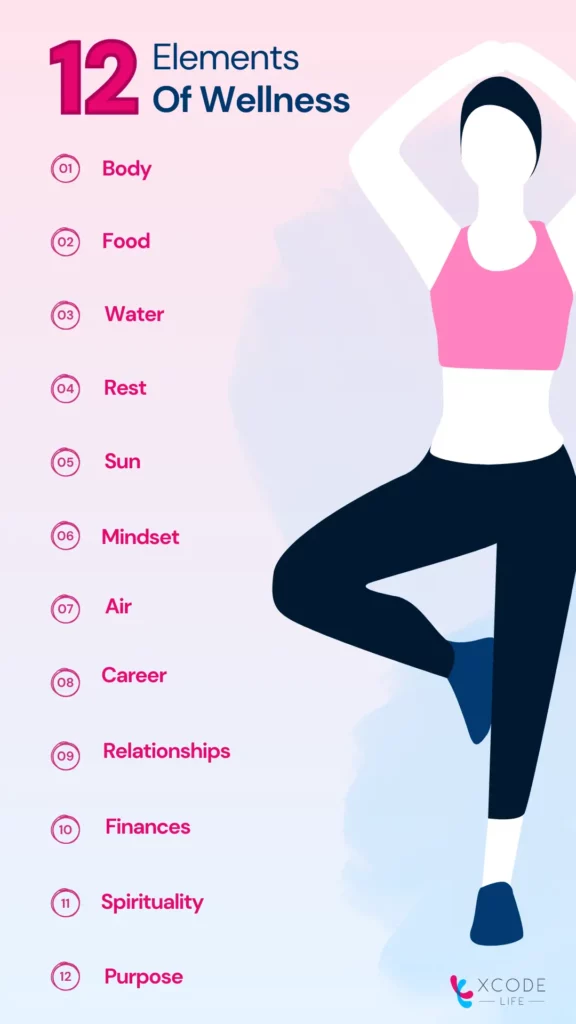
The main difference between health and wellness is the active process of achieving health, which is the goal.
Health is your predisposition to developing certain diseases like type 1 diabetes, hypertension, or cardiovascular diseases.
Wellness is the daily choices you make, like eating a balanced and taking the time out for exercise.
While you cannot always choose health, you can actively pursue wellness.
Here is a comparison between health and wellness:
Well-being is a state of equilibrium or balance in life.
It can be affected by life changes, personal problems, family responsibilities, etc.
Some define well-being as prosperity, happiness, comfort, and good health.
However, these descriptions might not fully describe well-being.
Well-being is more of a personal description of how an individual feels.
Wellness is more intricately connected to your physical and mental health.
In general, wellness practices aim to achieve optimum health through mindful practices and choices in life.
On the other hand, well-being is more connected to your emotional state.
Someone can be extremely ill yet described to be content and happy.
Similarly, someone can be physically and mentally healthy yet not feel balance and fulfillment.
This is the difference between wellness and well-being.
We recommend the Genome Pack! Rated 4.7/5 By Users Like You
This report is not a diagnostic tool but a resource to help you better understand your genetic tendencies. Combined with advice from a healthcare professional and other diagnostic methods, it can guide more informed lifestyle and dietary choices. Xcode Life doesn't ship out DNA kits.
Poor health implies that you are physically unwell and experiencing symptoms associated with diseases.
On the other hand, poor wellness means you don't experience any diagnosable symptoms, yet you don't feel content.
This can be due to a poor diet, stress, lack of sleep, and not feeling supported and cared for.
Over time, poor wellness can eventually lead to poor health.
Health is more focused on physical and mental wellness.
It also indicates an absence of signs and symptoms of diseases.
Well-being is not just about being physically or mentally healthy but also experiencing a general satisfaction in life.
You can not be your best healthy self yet feel completely content and safe in life.
Health is a measurable metric, and well-being is a perception.
Although health and wellness are distinct from each other, both of them go hand in hand.
A foundation of good health is essential to achieve wellness, while wellness helps you become healthier.
For instance, not suffering from any digestive issues is health.
However, to maintain this, you must eat a balanced meal full of whole foods, fiber, fresh fruits, and vegetables, which is wellness.
Health care is all about getting treated for your symptoms.
It encompasses diagnosis, medication, surgery, and rehabilitation for a disease.
Wellness care implies focusing on healthy eating, exercise, and stress management.
The health triangle represents a balance between the three aspects of health:
Health and wellness are often used interchangeably.
But they have two distinct meanings.
While health is more about whether you are free from symptoms of certain diseases, wellness incorporates certain practices that keep you healthy.
Health is mainly concerned with the optimum state of your body and mind.
Wellness involves your career goals, social health, relationships, and overall attitude toward life.
Being mindful about your wellness can, in turn, help improve your health.
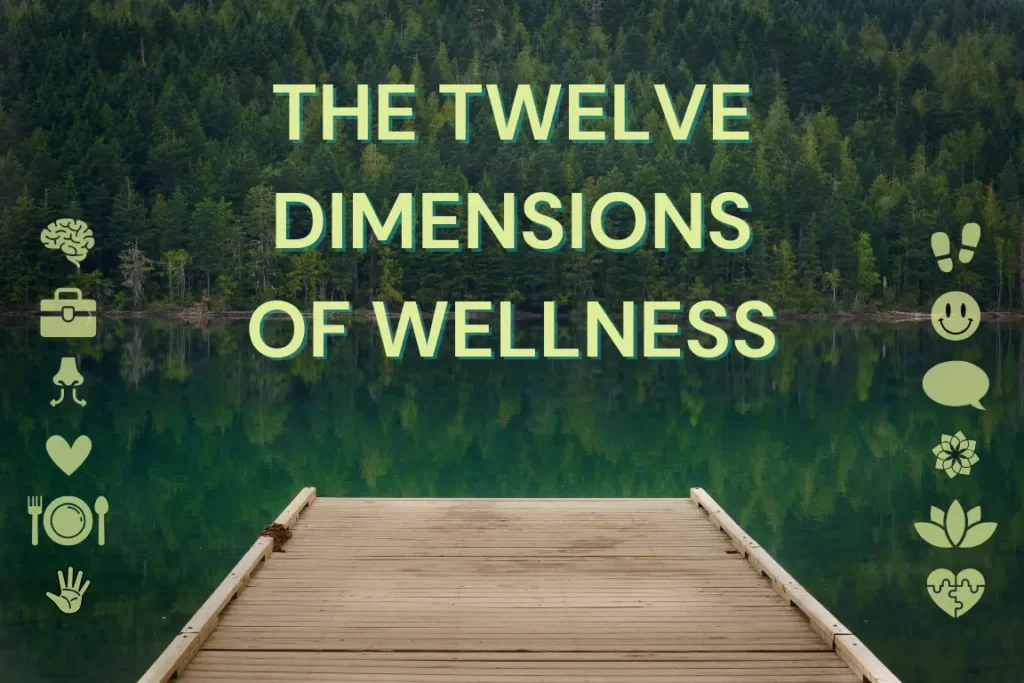
The 12 Dimensions Of Wellness
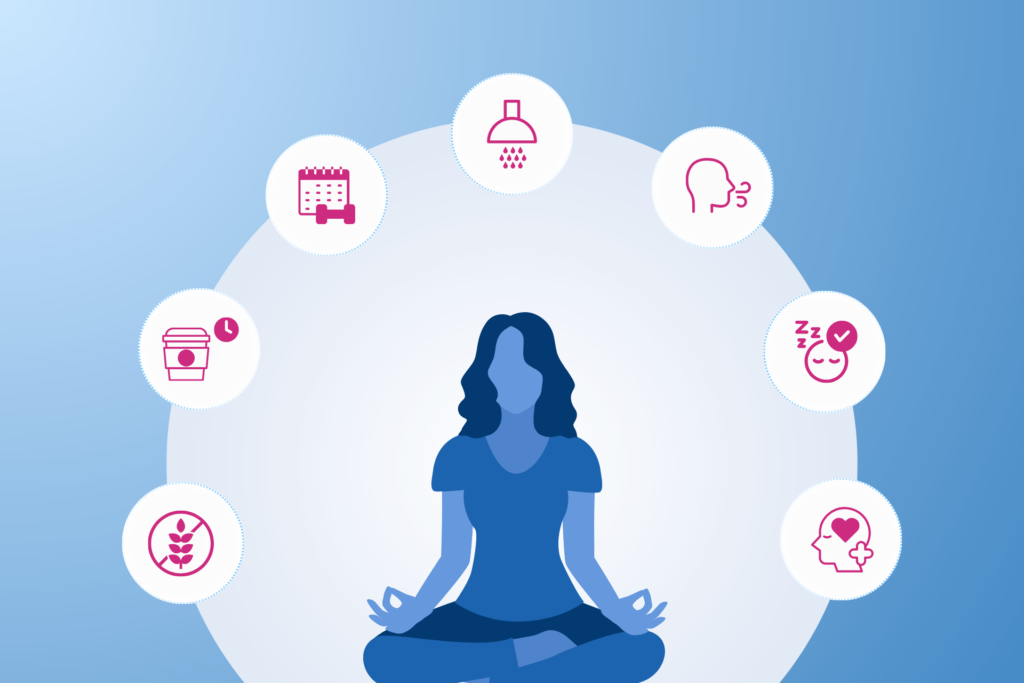
7 Best Biohacks For 2025 To Transform Your Health
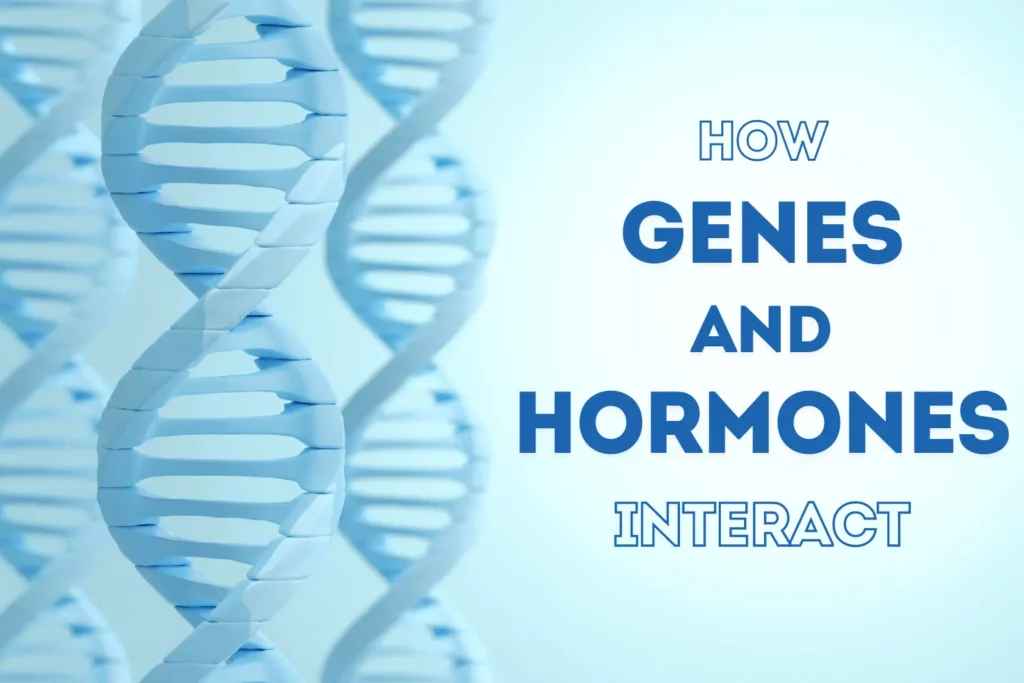
How Genes and Hormones Interact to Influence Your Health
In the ongoing battle for better health, the question of what truly shapes our well-being remains one of the most fascinating: is it our genes, the blueprint of life, or the lifestyle choices we make every day? The answer lies somewhere in the dynamic intersection between nature and nurture, where genetic makeup forms the foundation, but our actions and habits shape the outcomes. Imagine being able to unlock the potential of your own genetic code, all while taking charge of your lifestyle to enhance your health. But how exactly do these elements work together, and what role does each play in our overall well-being? This exploration into the complex relationship between genes, lifestyle, and environment reveals how to strike the perfect balance for a healthier, longer life.
Genes influence not only your appearance but also how your body functions, responds to diseases, and processes medications.
Some genetic variations increase the risk of inherited conditions, while others affect immunity, metabolism, and treatment effectiveness.
Identifying genetic differences helps in early disease detection and prevention.
If a person carries a gene linked to a specific illness, they can take preventive steps or undergo early screenings.
Genetic insights can guide treatment choices and predict health outcomes in cases where symptoms are already present.
Advances in genetics continue to improve disease management, offering more precise and personalized medical care.
Your behavior patterns and habits can impact both your physiological and psychological health.
Below, we explore four lifestyle elements that affect well-being.
A poor diet, often full of processed foods and unhealthy fats, can lead to obesity, cardiovascular problems, and other metabolic disorders.
In urban settings, fast food is a common culprit that contributes to these health concerns.
A healthy diet, rich in nutrients, can prevent many health issues and promote long-term well-being.
Exercise plays a significant role in both physical and mental health.
Regular physical activity helps prevent diseases, supports weight management, and boosts mood.
An active lifestyle is also linked to greater happiness, reduced stress, and improved mental clarity, enhancing emotional stability.
Vices like smoking and alcohol consumption have serious health consequences, contributing to diseases such as heart disease, cancer, and respiratory issues.
They also affect mental health, leading to anxiety and depression.
Avoiding or reducing these habits is crucial for maintaining a healthy body and mind.
The misuse of medications, including self-treatment or taking drugs without a prescription, is a common issue.
When we take medications without proper guidance, it can lead to issues like drug resistance and adverse reactions.
Responsible medication use is necessary to avoid these risks and to maintain overall health.
The condition of the environment dramatically influences overall health.
Air quality, water safety, and pollutant exposure can cause conditions like asthma, heart disease, and infections.
Contaminated water can result in waterborne diseases, and polluted air can cause respiratory problems.
Living near hazardous sites like factories or waste dumps increases the risk of long-term health issues, such as cancer.
Certain groups, including low-income communities, people of color, children, pregnant women, and older adults, are more vulnerable to these risks.
These groups are often exposed to more environmental hazards due to location and limited resources.
Climate change worsens these risks by increasing extreme weather events, rising temperatures, and poor air and water quality.
These changes can lead to heat stress, storm-related injuries, and the spread of diseases through contaminated water.
We recommend the Genome Pack! Rated 4.7/5 By Users Like You
This report is not a diagnostic tool but a resource to help you better understand your genetic tendencies. Combined with advice from a healthcare professional and other diagnostic methods, it can guide more informed lifestyle and dietary choices. Xcode Life doesn't ship out DNA kits.
The interplay of genes, lifestyle, and the environment forms a complex network of influences on our health.
Genetics provides the foundation for determining our susceptibility to certain conditions.
Lifestyle factors, such as physical activity, eating habits, and mental health, significantly influence how these genetic traits are expressed.
Furthermore, our living environment, including air quality and available resources, shapes our health outcomes.
These three factors interact constantly, creating a dynamic influence on our overall well-being.
Identifying one factor as the most important is challenging, but lifestyle choices often substantially influence health outcomes.
While genetics set the foundation, adopting a healthy lifestyle can significantly reduce risks, even for those with genetic predispositions.
Thus, lifestyle often serves as a key modulator in managing genetic and environmental influences on health.
Even if you're genetically predisposed, lifestyle changes can significantly offset those genetic influences.
A study published in the American Heart Association reveals that individuals with a high genetic risk for heart disease can lower their chances of developing it.
According to the survey, this can be achieved by adopting seven key lifestyle habits:
The study showed that white adults who adhered to these healthy habits gained up to 20 years of heart disease-free life.
The benefit was smaller for Black adults, with a 4.5-year increase in disease-free living, but it still demonstrates the positive impact of lifestyle changes.
This difference emphasizes that we need more genetic research in diverse populations to grasp the complicated relationship between lifestyle and genetics.
Ultimately, this research shows that while genetics play a role, lifestyle choices have a powerful influence on heart health and can significantly offset genetic risks.
Aging is influenced by both genetics and lifestyle, with their roles shifting at different stages of life.
Lifestyle factors, such as eating well, avoiding tobacco, staying active, and managing stress, play a dominant role in health and longevity during the early decades of life.
These healthy habits significantly reduce the risk of chronic diseases like heart disease, diabetes, and cancer, enabling many individuals to reach a healthy old age.
Genetics becomes increasingly significant as individuals age into their eighties and beyond.
Research suggests about 25% of the variation in human lifespan is attributed to genetics, though the specific genes involved remain under study.
Specific genes like APOE, FOXO3, and CETP are linked to longer lifespans, while some variants aid DNA repair and immune health.
While lifestyle choices can promote healthy aging, genetics plays a key role in sustaining health in later life.
Longevity is strongly associated with cardiorespiratory fitness, often measured by VO2 max (maximal oxygen consumption).
This metric reflects the body's efficient oxygen delivery and utilization by the heart, lungs, and skeletal muscles.
Regular physical activity enhances the function of these organs, improving overall health and reducing the risk of diseases that can shorten life.
While exercise cannot change the genetically fixed lifespan, it can improve fitness and quality of life, leading to a more extended, healthier existence.
Obesity is closely linked to both genetic and environmental factors, and recent research in epigenetics has shown how the environment can affect gene expression.
There are different genetic causes of obesity, such as:
Epigenetics helps us understand how environmental factors can change gene expression without altering the DNA.
Factors like poor nutrition, exposure to toxins, stress, and diet can lead to these changes, increasing the risk of obesity.
For example, poor nutrition or toxin exposure during pregnancy can affect the fetus (unborn baby), making it more likely to develop obesity later in life.
Additionally, unhealthy behaviors like a poor diet and lack of exercise can cause epigenetic changes in adults.
Studies like epigenome-wide association studies (EWAS) and genome-wide association studies (GWAS) help scientists identify genetic and epigenetic factors linked to obesity.
These studies show that mutations in genes related to hunger and fat storage, along with epigenetic changes, play a significant role in obesity.
No, there isn't a single "addiction gene."
Addiction develops through a mix of genetic influences and environmental conditions.
Each person inherits a unique set of genetic variations, which means different individuals can have different genetic risks for substance use disorder (SUD).
Studies suggest that genetics account for 40-60% of a person's susceptibility to addiction.
Many genes linked to addiction have been identified through research on both human and animal models.
Rather than a single genetic cause, addiction risk arises from the interaction of many genes that affect brain function, reward pathways, and response to substances.
Read our detailed article on the genetics of addition below.
https://www.cdc.gov/genomics-and-health/about/index.html
https://pmc.ncbi.nlm.nih.gov/articles/PMC4703222
https://pubmed.ncbi.nlm.nih.gov/28916933
https://medlineplus.gov/genetics/understanding/traits/longevity
https://pmc.ncbi.nlm.nih.gov/articles/PMC2726954
https://pubmed.ncbi.nlm.nih.gov/29293447
https://www.ncbi.nlm.nih.gov/books/NBK573068
https://learn.genetics.utah.edu/content/addiction/genes
Irritable bowel syndrome (IBS) is a group of conditions that affect the gastrointestinal tract - namely, the stomach and intestines.
It is characterized by symptoms like excess bloating and gas, diarrhea, constipation, and abdominal cramps.
Suma Magge, MD, a gastroenterologist at Norwalk Hospital, says that IBS can be subdivided into diarrhea-predominant irritable bowel versus constipation-predominant irritable bowel or even a mixed picture.
Scientists still don’t know exactly what causes IBS.
Food intolerances, stress, certain medications, genetic predispositions, and even gut bacteria imbalances are all possible culprits.
There’s also a growing consensus that nerve endings in the gut may be extra sensitive in people with IBS.
Wearable devices track various physiological metrics that can indicate changes in health status.
Four in particular caught the Mount Sinai team’s attention:
Taken together, these measurements can offer a window into your overall inflammation status.
Subtle changes in any of these metrics, even weeks before you feel any discomfort, might suggest that your body is heading toward a flare.
Mount Sinai researchers conducted this study on 309 participants across 36 states, all of whom had either ulcerative colitis or Crohn’s disease.
The participants were made to wear an Apple Watch, Fitbit, or Oura Ring and answer daily symptom surveys.
They also provided periodical blood and stool samples for assessment.
The wearable devices collected information on HR, HRV, SpO2, and activity levels.
The study was conducted from December 2021 until June 2023.
Up to seven weeks before people showed any indication of a flare — whether an inflammatory marker in blood tests or actual GI symptoms — these four wearable measurements had already started drifting from their baseline values.
| Phase | Heart Rate | Resting Heart Rate | Daily Steps |
| Inflammatory flares | Higher | Higher | Lower |
| Normal periods | Normal baseline value | Normal baseline value | Normal activity |
IBS often goes undiagnosed for an estimated 75% of cases.
And even if you do know you have it, there hasn’t been a great way to anticipate a flare.
Typically, you just start feeling abdominal discomfort right before the flare hits, leaving little to no time to intervene.
Early warning signals from wearables could change that.
If you know a flare is likely in a week or two, you (and your care team) might adjust your diet or medication before symptoms actually strike.
Dr. Hirten told Medical News Today that this method could potentially be applied to other chronic inflammatory conditions like rheumatoid arthritis. He also added that their goal is to develop AI-powered algorithms that crunch your wearable data in real-time to warn you — and your doctor — that trouble’s brewing.
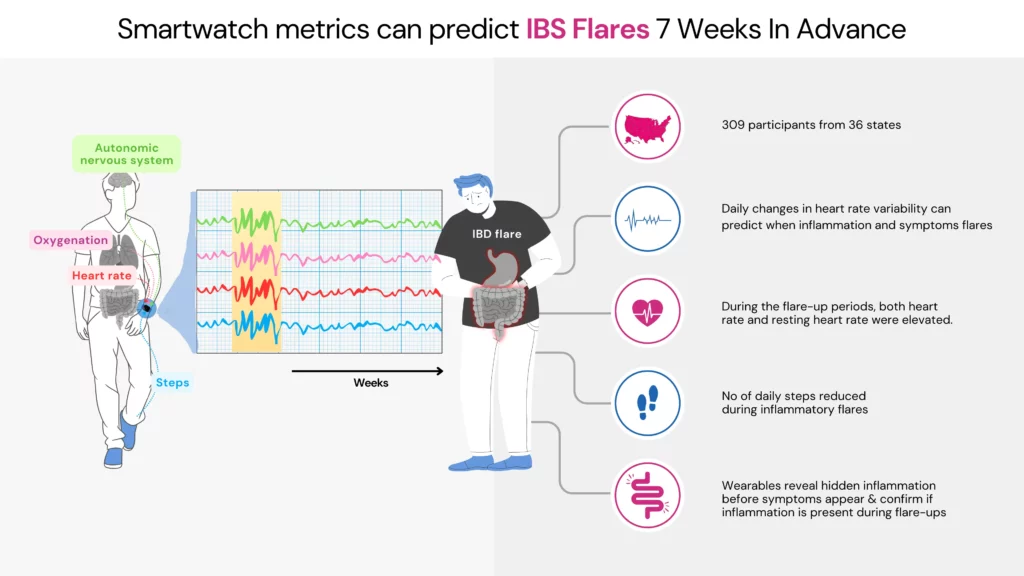
We recommend the Genome Pack! Rated 4.7/5 By Users Like You
This report is not a diagnostic tool but a resource to help you better understand your genetic tendencies. Combined with advice from a healthcare professional and other diagnostic methods, it can guide more informed lifestyle and dietary choices. Xcode Life doesn't ship out DNA kits.
“Everyone’s IBS triggers are as unique as a fingerprint,” explains Christine Lee, MD, a gastroenterologist at the Cleveland Clinic.
Maybe it’s stress, a missed night of sleep, a new medication, or one of countless possible diet tweaks.
Start a simple journal (or use a symptom-tracking app) to note what you eat, how you feel, and any stressors or schedule changes. Patterns often emerge faster than you think.
Beyond triggers, experts also emphasize a few key lifestyle tips:
Exercise is considered the best medicine for IBS management because regular movement improves circulation, supports digestive function, and helps reduce stress.
Dr. Magge says, “If you don’t have enough sleep, the effects of that could accentuate the symptoms of IBS.”
Maintaining a regular bedtime, avoiding late-night screen time, and making your bedroom as comfortable as possible can help calm an irritable bowel.
Staying hydrated throughout the day promotes normal bowel function.
Inadequate water intake can lead to constipation and other digestive issues, so make sure you’re drinking enough fluids.
While some people can sip coffee without a problem, others find that caffeine aggravates their symptoms.
Track how you feel after consuming caffeinated beverages. If you notice a pattern of discomfort, consider reducing or eliminating caffeine.
Dr. Bedford recommends eating plans along the lines of the Mediterranean diet as a good choice for people with IBS.
Dr. Magge suggests the low FODMAP diet—fermentable, oligosaccharides, disaccharides, monosaccharides and polyols—that can help reduce bloating, gas, and diarrhea.
Note: For those with IBS, any changes to their diet should be done only under the guidance of a healthcare professional.
While your smartwatch can’t diagnose you or cure you, it might soon be able to offer a heads-up before your gut decides to revolt. That could be the difference between catching a flare early — with small, strategic lifestyle or medication tweaks — and dealing with a full-blown, day-ruining attack.
As technology advances, combining wearable data with tried-and-true IBS management strategies may give you a proactive edge. In the meantime, keep listening to your body, stay on top of stress, and team up with your healthcare professionals to get ahead of (and maybe even outsmart) those IBS flare-ups.
https://www.gastrojournal.org/article/S0016-5085(25)00013-7/abstract
The popularity of at-home testing services and telehealth has grown massively since the COVID-19 pandemic. This year, it could grow to a $2 billion industry. EverlyWell is a company offering at-home testing for several conditions and disorders. While these tests are undoubtedly convenient, are they accurate? This article explores EverlyWell reviews, their tests, and their accuracy.
EverlyWell provides at-home testing for several conditions.
They have a range of tests to choose from.
Samples need to be self-collected and sent over by customers to their labs, which will test the samples.
While many have found their tests helpful, some have found them inaccurate.
EverlyWell is an Austin, Texas-based company that offers at-home testing.
The company was founded in 2015.
They offer more than 30 types of tests, including tests for:
Customers must take the samples and send them using prepaid expedited packaging.
The company delivers the results quickly through an online app.
You can also purchase EverlyWell test kits from Amazon, Walmart, and CVS.
EverlyWell tests are great for those who:
EverlyWell tests samples their customers provide through test kits mailed to laboratories.
These samples could be saliva, blood, etc.
The laboratory retrieves the results and provides them to the customers.
EverlyWell also offers free doctor consultations to help evaluate the test results and provide diagnoses if required.
The EverlyWell Food Sensitivity Test is a blood test that measures the body's immunoglobulin G (IgG) response to 98 different food items.
They have another comprehensive test that compares your sample against 204 items.
This test helps you identify food items that can cause an allergic reaction in your body.
However, the American Academy of Allergy, Asthma, and Immunology (AAAI) has stated that IgG levels alone do not equal an allergy.
You can have IgG in your blood due to exposure to certain foods.
EverlyWells's Women's Health Test is a comprehensive test that evaluates hormones and biomarkers covered by the Women's Fertility Test, Postmenopause Test, and Perimenopause Test.
The hormones and biomarkers tested include:
This test requires blood and saliva samples, which you should provide at different times of your menstrual cycle.
You will receive two blood collection cards and four saliva collection tubes with this test kit.
The EverlyWell Men's Health test examines four hormones using saliva.
It tests for Testosterone, Cortisol, DHEA, and Estradiol.
These hormones are associated with sex drive, muscle mass, weight balance, and energy levels in men.
Also, measuring their levels can indicate a problem with the glands that secrete them.
EverlyWell also has a testerorone test for men that measures the total testosterone levels in the body.
It requires a blood sample.
EverlyWell's STD test bundles test for six STIs:
For men, a blood and urine sample is required, while for women, a blood sample and vaginal swab is collected.
If you test positive for any of the STDs, a physician will contact you for free consultation and further treatment.
EverlyWell's Metabolism Test detects the levels of three hormones in your body: cortisol, free testosterone, and thyroid-stimulating hormone.
However, this test cannot determine the cause of the abnormal levels.
That's why it's best to consult your doctor about the results if you have an abnormally high level of any of these hormones.
This test is priced at $99.
EverlyWell's thyroid test analyzes three thyroid hormones: thyroid stimulating hormones T3 and T4 and thyroid peroxidase antibodies.
This test requires a blood sample and costs $149.
Hypothyroidism or hyperthyroidism can cause fatigue, dry skin, brittle nails, hair loss, and weight loss or gain.
Some conditions, like Hashimoto's disease, don't cause noticeable symptoms.
You can only learn about the condition by the presence of thyroid peroxidase antibodies in your blood.
EverlyWell also has tests to check cholesterol and lipid profiles, colon cancer screening tests, indoor and outdoor allergy tests, and heart health tests.
Getting started with EverlyWell is straightforward.
When reviewing EverlyWell's reports, it's important to consider:
EverlyWell tests cost $15 to $299, and membership is available for $24.99 monthly.
This membership, named Control, allows customers to get one free test and a 20% discount on every subsequent test.
Here's a more detailed overview of EverlyWell's test price range:
Pros of EverlyWell:
Cons of EverlyWell:
EverlyWell has an average rating of 2 out of 5 on Trustpilot.
Customers complain that the test results are sometimes inaccurate.
They also point out that the test results aren’t clinically valid until a doctor has ratified them and made a diagnosis.
Users on Reddit aren’t very convinced of EverlyWell’s tests.
Most said the results were vague and didn't reveal anything useful.
One user even claims that samples collected at home rarely provide accurate results.
EverlyWell keeps the DNA samples of customers who take their DNA tests.
Unless you explicitly request them to destroy your data, the company will indefinitely keep your data.
The company claims that they will never sell their customer's data.
EverlyWell uses bank-grade encryption to safeguard its customer's data.
They also don't host any data or servers themselves.
They use a HIPAA-compliant platform named ClearData to do this.
EverlyWell is a CLIA-certified company.
This certification means their laboratories regularly undergo inspections, and all testing is done under strict regulations.
Their tests can provide you with an overview of your health in an easy, convenient way.
However, their tests are by no means a replacement for doctor consultations.
If you test positive on any of EverlyWell's tests, a qualified physician will contact you at no extra cost to discuss your symptoms and further treatment options.
New York has stringent laws when it comes to at-home testing.
In addition to a complex billing system, NY has a law requiring the state health department to validate and approve every biomarker tested.
This process usually takes around 12-18 months, preventing at-home testing companies like EverlyWell from operating in NY.
Here are two alternatives to EverlyWell:

Viome Microbiome Analysis: An Honest Expert Review
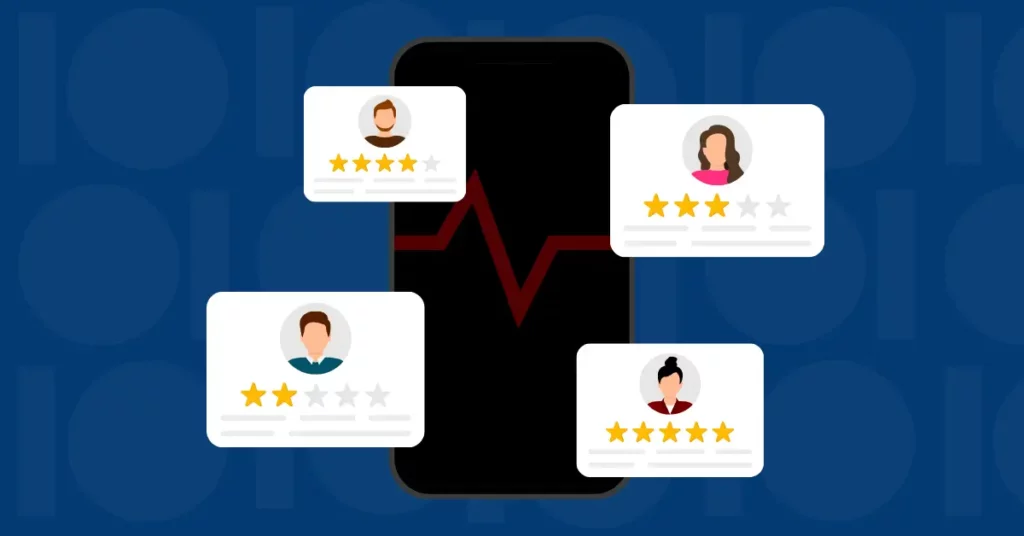
10X Health System Reviews: Detailed Overview, Cost, Pros & Cons

Genetic Lifehacks Review: What You Should Know Before Buying
https://pmc.ncbi.nlm.nih.gov/articles/PMC9035352
Acid reflux can be quite painful, but it's bound to happen to many of us from time to time. The right diet is essential to soothe your digestive tract and prevent further flare-ups. We've prepared a 7-day acid reflux diet plan that can help ease the symptoms of this disease. Read on to learn what's right and what you should avoid if you're struggling with acute or chronic GERD.
The American College of Gastroenterology defines GERD (gastroesophageal reflux disease) as a chronic condition where stomach acids flow back into the esophagus.
Most people will experience occasional discomfort from stomach acid reflux.
However, if the symptoms occur at least twice a week and cause significant discomfort, a doctor can diagnose you with chronic GERD.
The most common symptom of acid reflux is heartburn, a burning sensation in your chest.
Other symptoms of acid reflux are:
If you experience several of these symptoms, particularly nausea and vomiting, you should contact your healthcare provider.
Though GERD has different triggers for different people, some common triggers of GERD include:
Here is a list of foods that don't trigger acid reflux:
No specific food can help you get rid of acid reflux symptoms immediately.
However, an over-the-counter antacid or baking soda mixed with water can help ease symptoms immediately.
Peanut butter is rich in healthy fats.
Sometimes, doctors recommend creamy peanut butter to soothe esophagitis (inflammation of the esophagus).
Esophagitis has links to acid reflux, meaning peanut butter might help with GERD.
Eating too much peanut butter at once could trigger or worsen acid reflux.
Until studies determine the right amount of peanut butter for GERD, follow your healthcare provider’s advice.
Here are some drinks that can neutralize acid reflux:
Taking probiotics may help reduce symptoms of GERD by keeping harmful gut bacteria in check.
Probiotics aid digestion and can speed up the treatment of certain intestinal infections.
However, the application of probiotics to GERD needs further research.
After consulting a doctor, you can give probiotic foods a try.
The best meal for acid reflux includes low-fat, whole foods.
Consider including green vegetables, lean protein, and healthy foods.
Besides focusing on a balanced diet, here are a few more things to keep in mind when you have acid reflux:
Here’s a helpful 7-day acid reflux diet plan that could help manage GERD symptoms effectively.
| Breakfast | Lunch | Dinner | |
| Monday | Whole grain bread, hard-boiled egg, and a pear. | Whole grain roasted chicken tortilla and a salad. | Brown rice, grilled salmon with asparagus. |
| Tuesday | Oatmeal in low-fat or plant-based milk, bananas. | Brown rice, sauteed vegetables, and roasted chicken. | Zucchini noodles and baked potatoes. |
| Wednesday | Scrambled egg white with whole grain bread, a melon. | High fiber whole grain pasta, roasted chicken. | Baked potatoes and papaya. |
| Thursday | Oatmeal and bananas. | Tuna salad and pita bread. | Brown rice, roasted chicken, and carrot salad. |
| Friday | Low-fat yogurt and berries. | Whole tortilla with roasted turkey and broccoli. | Whole wheat pasta with grilled shrimp. |
| Saturday | Whole grain bread and scrambled egg whites. | Brown rice with grilled salmon. | Grilled salmon with baked potatoes. |
| Sunday | Oatmeal with bananas and apples. | Tuna salad with pita bread. | High-fiber pasta with roasted chicken. |
Here is a list of common GERD triggers to avoid if you currently have the disease:
If you suffer from acid reflux, consider consuming foods high in good fats and protein.
Here are a few dinner ideas if you have acid reflux:
The best soups for acid reflux are:
Avoid the following kinds of soups:
Having your soup too fast could also set off acid reflux.
Eating out might seem daunting since it could trigger your GERD easily.
If you find yourself at a restaurant, here’s what to keep in mind:

The Ultimate Guide To Anti-inflammatory Diet + Food List PDF

Gary Brecka 30-30-30 Diet: How To Follow, Pros, And Cons

Should You Take DGL Supplements To Treat Acid Reflux?
https://pubmed.ncbi.nlm.nih.gov/30381627
While most of us cannot even fully open our eyes without taking a sip of coffee first thing in the morning, a whole wave of online influencers have opposing views.
They recommend abstaining from coffee for 90-120 minutes after waking up to reap the full benefits of caffeine.
They’re calling it the “game-changing” way of drinking coffee since it lets your body awaken more naturally and prevents the afternoon slump.
The drowsy feeling that finally makes us want to put down our phones and pull up our blankets is all thanks to a hormone called adenosine.
It binds to certain receptors in the brain to induce sleep. Caffeine, structurally similar to adenosine, wards off sleep by binding to the same receptors, thereby blocking adenosine.
Caffeine starts working as quickly as five minutes and typically hits its peak around 45 - 60 minutes after consumption, said Largemon-Roth, a New York-based registered dietitian nutritionist.
But not all of us respond the same way to caffeine.
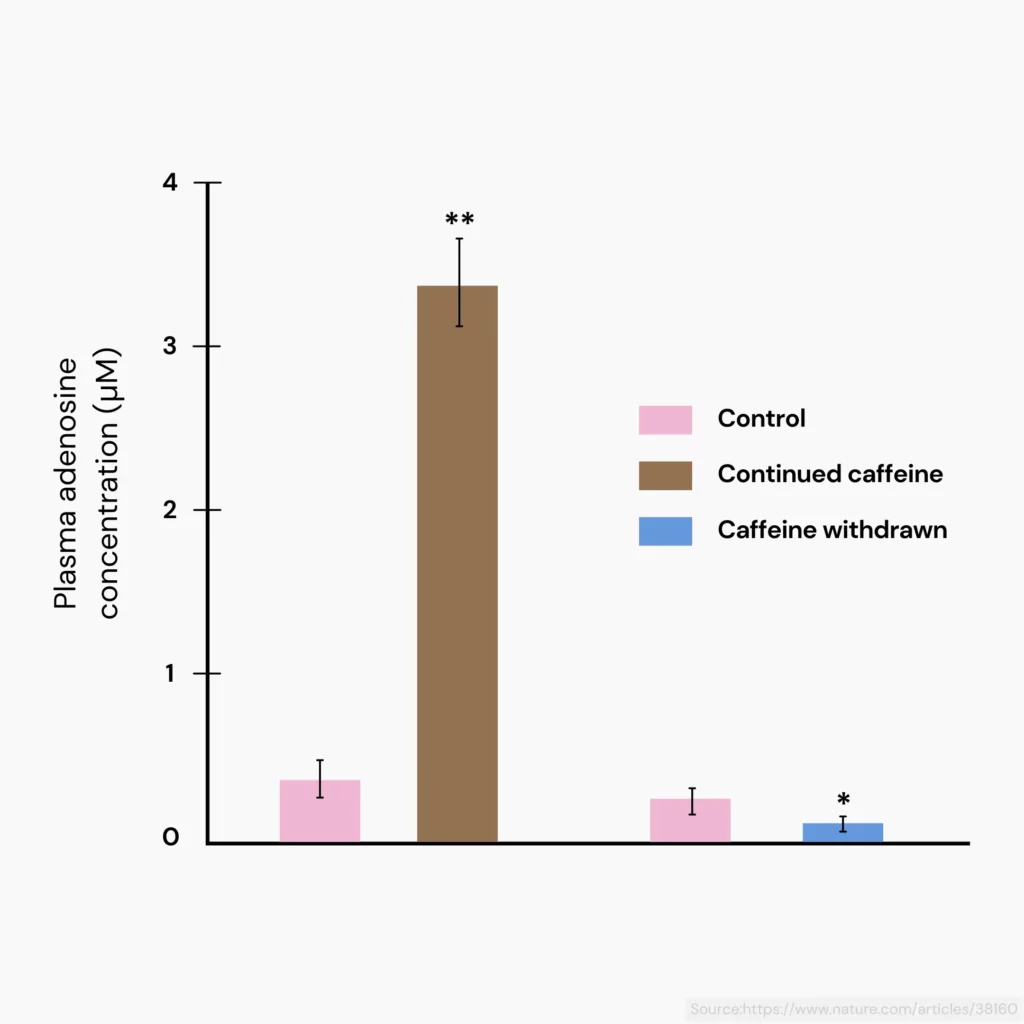
Approximately 95% of caffeine is metabolized by this one gene called CYP1A2 (pronounced sip-one-A-two).
CYP1A2 exists in many forms, each breaking down caffeine at different rates.
If you have the “fast-metabolizing” form, then you eliminate caffeine quickly and will likely reach out for a second cup shortly after the first.
On the other hand, the “slow metabolizing” variant pushes out caffeine slowly.
Rated 4.7/5 By Users Like You
This report is not a diagnostic tool but a resource to help you better understand your genetic tendencies. Combined with advice from a healthcare professional and other diagnostic methods, it can guide more informed lifestyle and dietary choices. Xcode Life doesn't ship out DNA kits.
Cortisol, the major stress hormone in your body, is not just involved in fight-or-flight but also helps you be alert.
“You naturally release cortisol in the morning to help you become more alert and aware of your surroundings as you wake from your slumber,” DiMarino, a registered dietitian, explains.
Later in the day, when cortisol levels slowly start to decline, having your first cup of coffee can help avoid the energy crash, as explained by Emma Lowe, who shared their “delayed coffee” experience on MBG.
Even after you wake up, adenosine molecules still remain bound to their receptors for a while. So, with less competition for caffeine, the rationale is that it might not give you the energy boost you need.
When people consume caffeine immediately after waking, they often experience a significant energy dip in the early afternoon, known as the "afternoon crash." This crash occurs because the effects of the morning caffeine start to wear off, revealing the accumulated adenosine, says Andrew Huberman, a prominent American neuroscientist and podcaster.
Despite the claims and buzz, there’s little evidence to prove caffeine’s disruptive effects on the “natural waking up process.”
A 2019 study that examined the effects of caffeine on sleep-wake regulation reported that “Neither the time course of melatonin nor cortisol was significantly affected by caffeine or withdrawal.”
According to the CDC, 1 in 3 adults do not get enough sleep.
Considering caffeine’s proven effect on mental alertness and physical performance, it can really help you spring up to alertness first thing in the morning.
Let’s also not forget that for many, coffee isn’t just about the morning kick - its ability to trigger bowel movement has become a dependency.
As Huberman describes, if you work out first thing in the morning, having a cup of coffee right after you wake up can give you the energy boost for working out.
While caffeine’s wakefulness effect is a boon in the daytime, consuming it later in the day can interfere with sleep, leading to restless nights and groggy mornings, which is far from enjoyable.
So, it is important to time your last cup of coffee for the day.
While 6-8 hours before bedtime is the recommended time, slow metabolizers of caffeine may need to give it a good 10-12 hour-gap.
For most, cutting off coffee consumption by 12 PM - 2 PM can help prevent caffeine-induced sleep disturbances.
There isn’t a universal “best” time to have your morning coffee. Some people may find waiting 90–120 minutes after waking helps sustain energy levels into the afternoon. Others need that caffeine boost immediately to function—especially if they are not getting good nights' sleep, working night shifts, juggling a newborn’s schedule, or training for an early workout. Genetics, lifestyle, and individual tolerance play a significant role in how caffeine affects you. Regardless of when you take that first sip, be mindful of your last cup; cutting off caffeine 6–8 hours (or longer, for slow metabolizers) before bedtime can help ensure a good night’s sleep. Ultimately, the “right” timing is about balancing personal preference, daily demands, and healthy sleep practices.